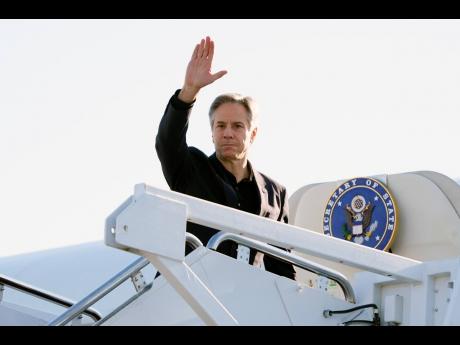Blinken begins key visit as tensions rise over new US foreign aid bill
SHANGHAI (AP):
US Secretary of State Antony Blinken begun a critical trip to China armed with a strengthened diplomatic hand following Senate approval of a foreign aid package that will provide billions of dollars in assistance to Ukraine, Israel and Taiwan, as well as force TikTok’s China-based parent company to sell the social media platform – all areas of contention between Washington and Beijing.
Blinken arrived in Shanghai on Wednesday just hours after the Senate vote on the long-stalled legislation and shortly before President Joe Biden is expected to sign it into law to demonstrate US resolve in defending its allies and partners. Passage of the bill will add further complications to an already-complex relationship that has been strained by disagreements over numerous global and regional disputes.
Still, the fact that Blinken is making the trip – shortly after a conversation between Biden and Chinese President Xi Jinping, a similar visit to China by Treasury Secretary Janet Yellen, and a call between the US and Chinese defence chiefs – is a sign the two sides are at least willing to discuss their differences.
Of primary interest to China, the bill sets aside $8 billion to counter Chinese threats in Taiwan and the broader Indo-Pacific and gives China’s ByteDance nine months to sell TikTok, with a possible three-month extension if a sale is in progress. China has railed against US assistance to Taiwan, which it regards as a renegade province, and immediately condemned the move as a dangerous provocation. It also strongly opposes efforts to force TikTok’s sale.
The bill also allots $26 billion in wartime assistance to Israel and humanitarian relief to Palestinians in Gaza, and $61 billion for Ukraine to defend itself from Russia’s invasion. The Biden administration has been disappointed in China’s response to the war in Gaza, and has complained loudly that Chinese support for Russia’s military-industrial sector has allowed Moscow to subvert Western sanctions and ramp up attacks on Ukraine.
Even before Blinken landed in Shanghai, China’s Taiwan Affairs Office slammed the assistance to Taipei, saying it “seriously violates” US commitments to China, “sends a wrong signal to the Taiwan independence separatist forces”, and pushes the self-governing island republic into a “dangerous situation”.
MAJOR PLAYERS
China and the United States are the major players in the Indo-Pacific and Washington has become increasingly alarmed by Beijing’s growing aggressiveness in recent years towards Taiwan and Southeast Asian countries with which it has significant territorial and maritime disputes in the South China Sea.
The US has strongly condemned Chinese military exercises threatening Taiwan, which Beijing regards as a renegade province and has vowed to reunify with the mainland, by force if necessary. Successive US administrations have steadily boosted military support and sales for Taiwan, much to Chinese anger.
On Ukraine, which US officials say will be a primary topic of conversation during Blinken’s visit, the Biden administration said that Chinese support has allowed Russia to largely reconstitute its defence industrial base, affecting not only the war in Ukraine, but posing a threat to broader European security.
“If China purports on the one hand to want good relations with Europe and other countries, it can’t, on the other hand, be fuelling what is the biggest threat to European security since the end of the Cold War,” Blinken said last week.
China says it has the right to trade with Russia and accuses the US of fanning the flames by arming and funding Ukraine. “It is extremely hypocritical and irresponsible for the US to introduce a large-scale aid bill for Ukraine, while making groundless accusations against normal economic and trade exchanges between China and Russia,” Chinese Foreign Ministry spokesperson Wang Wenbin said on Tuesday.
On the Middle East, US officials, from Biden on down, have repeatedly appealed to China to use any leverage it may have with Iran to prevent Israel’s war against Hamas in Gaza from spiralling into a wider regional conflict.
While China appears to have been generally receptive to such calls – particularly because it depends heavily on oil imports from Iran and other Middle East nations – tensions have steadily increased since the beginning of the Gaza war in October and more recent direct strikes and counterstrikes between Israel and Iran.
Blinken has pushed for China to take a more active stance in pressing Iran not to escalate tensions in the Middle East. He has spoken to his Chinese counterpart, Wang Yi, several times urging China to tell Iran to restrain the proxy groups it has supported in the region, including Hamas, Lebanon’s Hezbollah, Yemen’s Houthis, and Iranian-backed militias in Iraq and Syria.
The two sides agreed last year to set up a working group to look into ways to combat the surge of production of fentanyl precursors in China and their export abroad. US officials say they believe they had made some limited progress on cracking down on the illicit industry, but many producers had found ways to get around new restrictions.
“We need to see continued and sustained progress,” the official said, adding that “more regular law enforcement” against Chinese precursor producers “would send a strong signal of China’s commitment to address this issue”.

